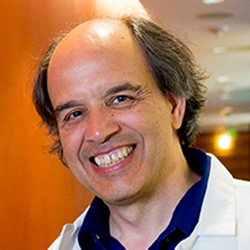Ramirez Lab
Pursuing Cures for Neurological Disorders
The Ramirez Lab investigates brain functions in order to develop new ways to treat – and potentially cure – neurological disorders.
We are particularly interested in how neurons form into networks, and how those networks turn on and off to create rhythms that direct the brain – and the body – to perform different functions.
We take a collaborative approach to research, teaming up with experts in different disciplines – from genetics to biology to engineering – to study brain disorders and pursue cures. Our current research includes:
Unraveling the mechanisms that control breathing
We discovered the neuronal network that controls gasping, which helps animals and people take in air and survive when they’re starved of oxygen. Now we’re pinpointing the networks that control other aspects of breathing. This research is helping us understand sudden infant death syndrome (SIDS) and erratic breathing in children with Rett syndrome, epilepsy and other disorders.
Working to prevent SIDS
We are collaborating with Dr. Daniel Rubens to study how inner ear problems contribute to SIDS. Rubens was the first researcher to discover that newborns with inner ear damage face higher SIDS risk. Our work could lead to new ways to prevent SIDS.
Studying how media use impacts brain development
We are teaming up with Dr. Dimitri Christakis and his lab to investigate how television and media impact brain development. Our initial research showed that too much media exposure can trigger attention problems in mice.
Addressing attention and impulse control disorders
Tourette syndrome, attention deficit hyperactivity disorder (ADHD), obsessive-compulsive disorder and other conditions are united by a key thread: Affected children can’t control unwanted behaviors. We’re unraveling how the brain controls impulses and attention, and are studying promising therapies that correct these problems in mice.
Understanding fatal seizures
We are collaborating with Dr. Franck Kalume and his lab to understand the causes of a fatal condition called sudden and unexpected death in epilepsy, and find ways to prevent it.
Learn more
To learn more about the Ramirez Lab’s research and publications, please visit our University of Washington website.
Lab News
Brainstem Region Revealed to Play Role in Regulating Swallow, Breathing
June 30, 2023 – Seattle Children’s researchers revealed novel insights about PiCo, a brainstem region that aids the coordination of swallowing and breathing.
How does the brain coordinate swallowing and breathing?
July 14, 2022 – In their paper published in PNAS, Alyssa Huff and Nino Ramirez are the first to discover the neural pathways involved in swallow-breathing coordination
Answering a Century-Old Question: How Do Gas Anesthetics Work in the Brain?
June 9, 2022 – In their paper published in Current Biology, Seattle Children's researchers are the first to discover how gas anesthetics cause unconsciousness at the cellular level.
Investigator Biography

Nino Ramirez
Jan-Marino (Nino) Ramirez, PhD, is director of the Center for Integrative Brain Research at Seattle Children’s Research Institute and a professor of neurological surgery at the University of Washington. His work is supported by multiple National Institutes of Health grants.